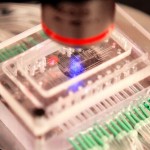I’ve written a few times this week on various projects that are aiming to lower the cost of conducting scientific research.
For instance, a study from the Michigan Technological University highlighted the large potential of open source manufacturing in lab equipment.
Swedish company Teenage Engineering shows how this could unfold, with their open source approach to the manufacturing of their synthesizer products.
Cheap labs on a chip
Of course, such an open source approach is not the only way cost savings could be delivered. A recent study explores the potential benefits of a lab on a chip.
The device is aimed at making it easier to perform lab tests on blood and other fluids for things such as Lyme disease and HIV. The device requires roughly 90 percent less fluid than traditional lab tests.
“A great deal of research has been hindered because in many cases one is not able to extract enough fluid,” the authors say.
Not only does the device require fewer fluids, it also requires roughly 10 percent of the chemicals used to perform multiplex immunoassay tests. These tests traditionally cost up to $1,500, so the potential savings are considerable, especially as the process is largely automated, so reduces the need for skilled labor.
A new era of research
The new device promises to herald a new era for research. Testing on various central nervous system disorders has traditionally been limited because scientists could not extract enough fluid from the spine to perform the conventional tests.
“With our technology, researchers will be able to perform large-scale controlled studies with comparable accuracy to conventional assays,” the team say.
It could also support a more thorough level of research into areas such as autoimmune joint diseases, including rheumatoid arthritis, where the availability of fluid is also an issue.
The device, which has been dubbed ELISA-on-a-chip, is capable of analyzing 32 samples at any one time, and can also measure a large range of concentrations of up to six proteins in a single sample.
The next stage is to explore the commercial possibilities for their device, but it seems certain that this kind of functionality will find a use somewhere, especially as the lead researcher is now working at GSK.
Watch this space.

Very cool 🙂